How Lifestyle Affects Mental Health of Students in the UK
61 Pages2512 Words373 Views
Added on 2023-06-12
About This Document
This study investigates the impact of lifestyle on the mental health of students in the UK. It includes a literature review and a quantitative research methodology with a sample of 20 students from the University of Cambridge. Results show that lifestyle changes affect mental health, leading to increased stress among students. The study recommends ways to improve student lifestyle for better mental health.
How Lifestyle Affects Mental Health of Students in the UK
Added on 2023-06-12
ShareRelated Documents
Quantitative research methods for social scientist
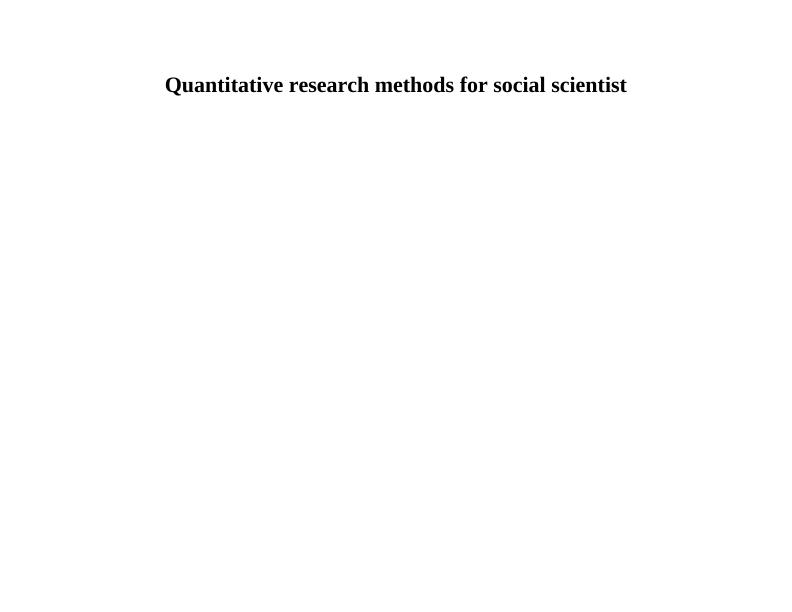
ABSTRACT
A healthy lifestyle is also beneficial for the one’s mental health because it promote to the physiological well-being and reduces
mental problems. The study is also based upon how life style changes affect the mental health of people and for that 20 students of
University of Cambridge has chosen that determine their views regarding the chosen topic. The results indicated that opinion of male
and female is different with regard to changing life style and that is why, the null hypothesis is accepted. Further, their views does not
match and this in turn shows there is a relationship identified between mental health and changing life style and that is why, it do
affected because it lead to increase stress among people.
A healthy lifestyle is also beneficial for the one’s mental health because it promote to the physiological well-being and reduces
mental problems. The study is also based upon how life style changes affect the mental health of people and for that 20 students of
University of Cambridge has chosen that determine their views regarding the chosen topic. The results indicated that opinion of male
and female is different with regard to changing life style and that is why, the null hypothesis is accepted. Further, their views does not
match and this in turn shows there is a relationship identified between mental health and changing life style and that is why, it do
affected because it lead to increase stress among people.
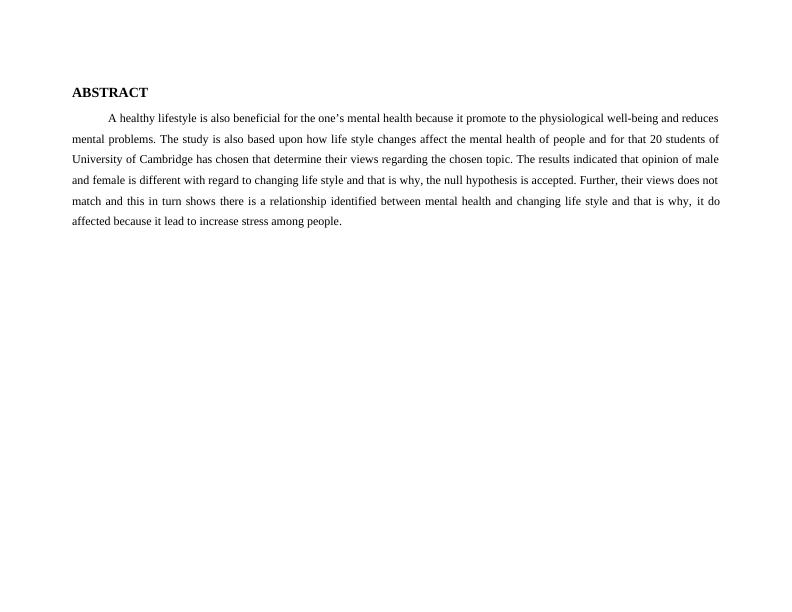
Table of Contents
ABSTRACT................................................................................................................................................................................................2
INTRODUCTION.......................................................................................................................................................................................4
Background..............................................................................................................................................................................................4
Rationale..................................................................................................................................................................................................4
Research aim and objectives....................................................................................................................................................................4
LITERATURE REVIEW............................................................................................................................................................................5
METHODOLOGY......................................................................................................................................................................................6
RESULTS....................................................................................................................................................................................................6
DISCUSSION..............................................................................................................................................................................................9
CONCLUSION............................................................................................................................................................................................9
REFERENCES..........................................................................................................................................................................................10
APPENDIX................................................................................................................................................................................................11
Questionnaire.........................................................................................................................................................................................11
Frequency table......................................................................................................................................................................................14
ABSTRACT................................................................................................................................................................................................2
INTRODUCTION.......................................................................................................................................................................................4
Background..............................................................................................................................................................................................4
Rationale..................................................................................................................................................................................................4
Research aim and objectives....................................................................................................................................................................4
LITERATURE REVIEW............................................................................................................................................................................5
METHODOLOGY......................................................................................................................................................................................6
RESULTS....................................................................................................................................................................................................6
DISCUSSION..............................................................................................................................................................................................9
CONCLUSION............................................................................................................................................................................................9
REFERENCES..........................................................................................................................................................................................10
APPENDIX................................................................................................................................................................................................11
Questionnaire.........................................................................................................................................................................................11
Frequency table......................................................................................................................................................................................14
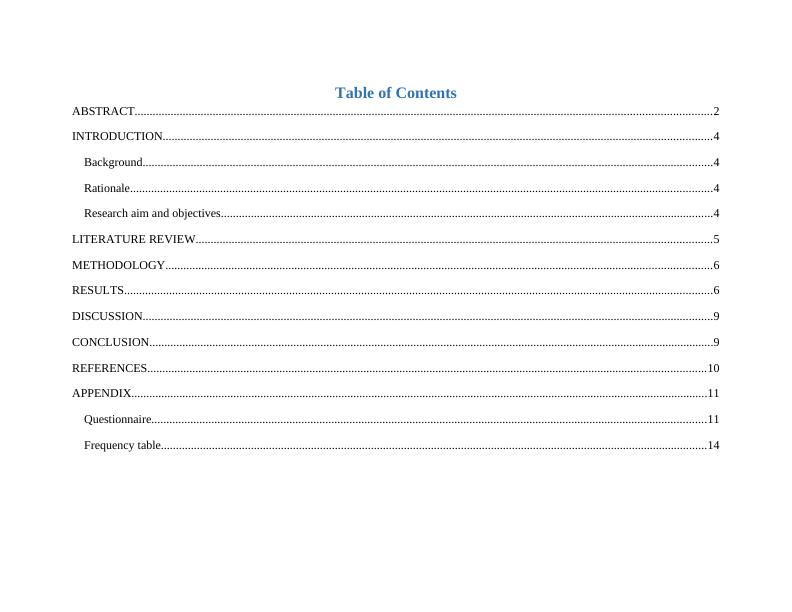
Topic: How can lifestyle affect mental health of students in the UK
INTRODUCTION
Background
A number of life style factors been recognized to play an important role in mental health of students. There are both positive as
well as negative factor that are directly associated with student’s performance especially to mental fitness. Like, a student get a
positive environment then the chances of enjoying their life will high and this in turn causes positive impact over their health.
Therefore, the chosen university for this study is Cambridge which is recognized for their best culture and environment. That is why,
the current study will help to determine the positive as well as negative aspect of life style and how it contribute to mental health of
students.
Rationale
The reason for opting this topic is such that to investigate how life style affect the mental health of students because most of
the students start indulging in wrong habits that leads to stress and uneasiness. That is why, it become an issue for the society because
students perform activities with their own wish and that is why, it cause adverse impact upon their mental health when they opt for the
wrong habits like smoking, unhealthy food etc. The present study shed a light by generating the results from software upon how life
style changes affect mental health.
Research aim and objectives
The aim of this topic is to investigate how lifestyle affect the mental health of student in University of Cambridge
Objectives:
To understand the concept of mental health
INTRODUCTION
Background
A number of life style factors been recognized to play an important role in mental health of students. There are both positive as
well as negative factor that are directly associated with student’s performance especially to mental fitness. Like, a student get a
positive environment then the chances of enjoying their life will high and this in turn causes positive impact over their health.
Therefore, the chosen university for this study is Cambridge which is recognized for their best culture and environment. That is why,
the current study will help to determine the positive as well as negative aspect of life style and how it contribute to mental health of
students.
Rationale
The reason for opting this topic is such that to investigate how life style affect the mental health of students because most of
the students start indulging in wrong habits that leads to stress and uneasiness. That is why, it become an issue for the society because
students perform activities with their own wish and that is why, it cause adverse impact upon their mental health when they opt for the
wrong habits like smoking, unhealthy food etc. The present study shed a light by generating the results from software upon how life
style changes affect mental health.
Research aim and objectives
The aim of this topic is to investigate how lifestyle affect the mental health of student in University of Cambridge
Objectives:
To understand the concept of mental health
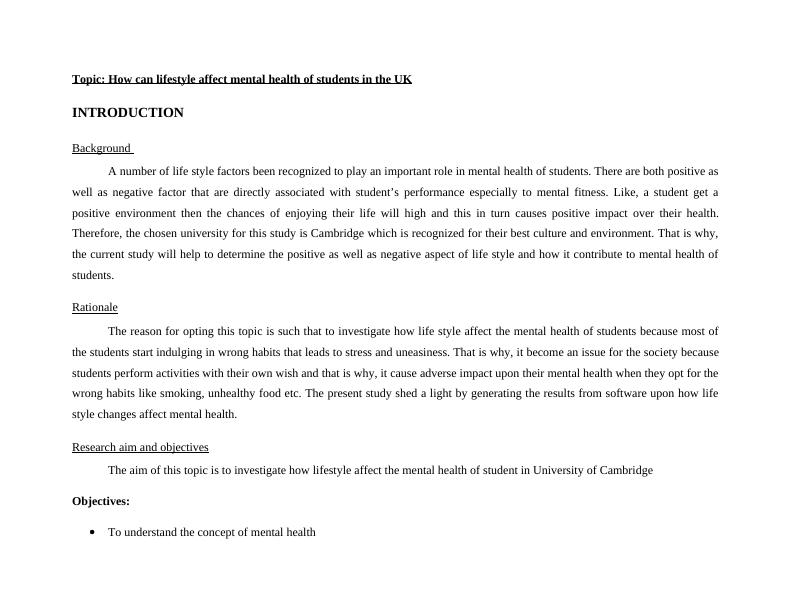
To ascertain the factors of life style that affect student’s mental health.
To identify the relationship between life style and mental health of students.
To recommend the best ways through which life style of students can improve.
Research questions
Q1: What is the concept of mental health?
Q2: What are the factors of life style that affect student’s mental health?
Q3: What is the relationship between life style and mental health of students?
LITERATURE REVIEW
According to Velten and et.al., (2018) mental health mainly includes emotional, psychological and social well-being that
affects how individual thinks, feel and act. To become fit, mental health plays an important role because it is associated with brain that
determine who to handle stress and make choices.
Hanawi and et.al., (2020) explained in their study that there are number of lifestyle factors that contributes to the mental health
like work, diet, drugs and lack of sleep because if the students faces any issue then their mental health got affected. Moreover, a lack
of physical activity, smoking and excessive alcohol consumption always affect the mental health into negative manner. On the other
side, Hossain and et.al., (2019) critically evaluated that consumption of health food, perfect body mass index always assist to improve
the mental health because it also focus upon physical health of an individual.
Loewen and et.al., (2019) reflected in their study that there is a positive relationship between the lifestyle and mental health
because a good intake of food assist to improve the sleep that lower down the mental health issues effectively. Moreover, an irregular
lifestyle always affects the overall mental health into negative manner such that they consume more energy in order to make strategy
To identify the relationship between life style and mental health of students.
To recommend the best ways through which life style of students can improve.
Research questions
Q1: What is the concept of mental health?
Q2: What are the factors of life style that affect student’s mental health?
Q3: What is the relationship between life style and mental health of students?
LITERATURE REVIEW
According to Velten and et.al., (2018) mental health mainly includes emotional, psychological and social well-being that
affects how individual thinks, feel and act. To become fit, mental health plays an important role because it is associated with brain that
determine who to handle stress and make choices.
Hanawi and et.al., (2020) explained in their study that there are number of lifestyle factors that contributes to the mental health
like work, diet, drugs and lack of sleep because if the students faces any issue then their mental health got affected. Moreover, a lack
of physical activity, smoking and excessive alcohol consumption always affect the mental health into negative manner. On the other
side, Hossain and et.al., (2019) critically evaluated that consumption of health food, perfect body mass index always assist to improve
the mental health because it also focus upon physical health of an individual.
Loewen and et.al., (2019) reflected in their study that there is a positive relationship between the lifestyle and mental health
because a good intake of food assist to improve the sleep that lower down the mental health issues effectively. Moreover, an irregular
lifestyle always affects the overall mental health into negative manner such that they consume more energy in order to make strategy
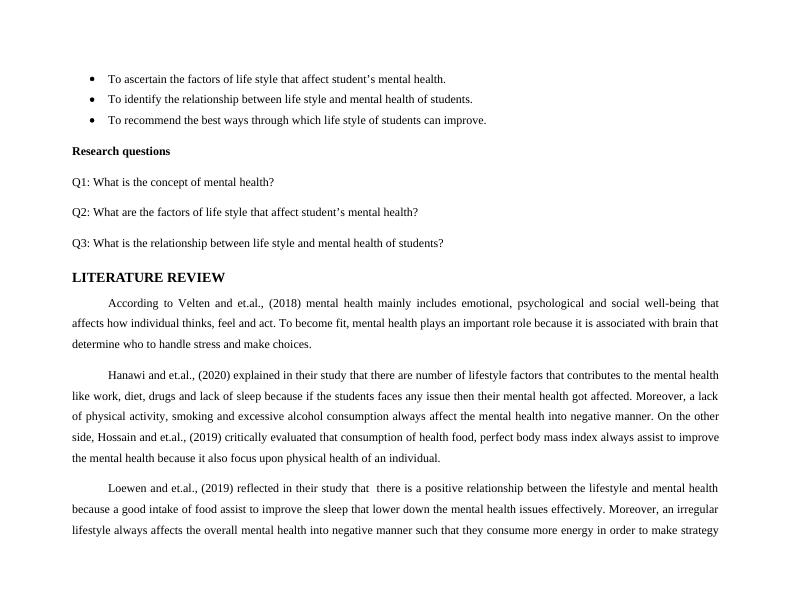
to improve the lifestyle which lead to depression as well. This is mainly identified among students due to high consumption of
smoking and unhealthy food always lead to affect the overall mental health into negative manner.
METHODOLOGY
Research Method: for the present study, only quantitative study has been identified which helps to reflect upon the numbers
and facts pertaining to life style and its impact over the mental health of students (Snyder, 2019). This also assist to create
better outcome because it describes the trend where student’s mental status has affected due to changing life style.
Sampling: For the current study only simple random sampling method has been adopted that helps to choose the university
randomly. There are thousands of people who study in the school and that is why, it is not possible to choose all and that is
why, 20 students including male and female has chosen randomly.
Research process: For the study, research aim has defined and objectives drawn for which the scholar collect sources in order
to attain the same. Then methodology has defined through which data collection methods has been decided. Further,
questionnaire has been draft that helps to meet the defined aim. Lastly, by analyzing the data in an effective manner, scholar
uses SPSS software that provide authentic results.
Ethical consideration: Proper consent should be taken from the selected respondents that assist to ascertain the voluntarily
participation of the selected respondents (Pandey and Pandey, 2021). Also, data protection act need to be complied that assist
to protect the data from the third party.
Reflexivity: I play a role of researcher in the project that helps me to gain knowledge pertaining to the present study and it also
involves examining and consciously acknowledging the assumptions that help to conduct research effectively.
RESULTS
Descriptive statistics
smoking and unhealthy food always lead to affect the overall mental health into negative manner.
METHODOLOGY
Research Method: for the present study, only quantitative study has been identified which helps to reflect upon the numbers
and facts pertaining to life style and its impact over the mental health of students (Snyder, 2019). This also assist to create
better outcome because it describes the trend where student’s mental status has affected due to changing life style.
Sampling: For the current study only simple random sampling method has been adopted that helps to choose the university
randomly. There are thousands of people who study in the school and that is why, it is not possible to choose all and that is
why, 20 students including male and female has chosen randomly.
Research process: For the study, research aim has defined and objectives drawn for which the scholar collect sources in order
to attain the same. Then methodology has defined through which data collection methods has been decided. Further,
questionnaire has been draft that helps to meet the defined aim. Lastly, by analyzing the data in an effective manner, scholar
uses SPSS software that provide authentic results.
Ethical consideration: Proper consent should be taken from the selected respondents that assist to ascertain the voluntarily
participation of the selected respondents (Pandey and Pandey, 2021). Also, data protection act need to be complied that assist
to protect the data from the third party.
Reflexivity: I play a role of researcher in the project that helps me to gain knowledge pertaining to the present study and it also
involves examining and consciously acknowledging the assumptions that help to conduct research effectively.
RESULTS
Descriptive statistics
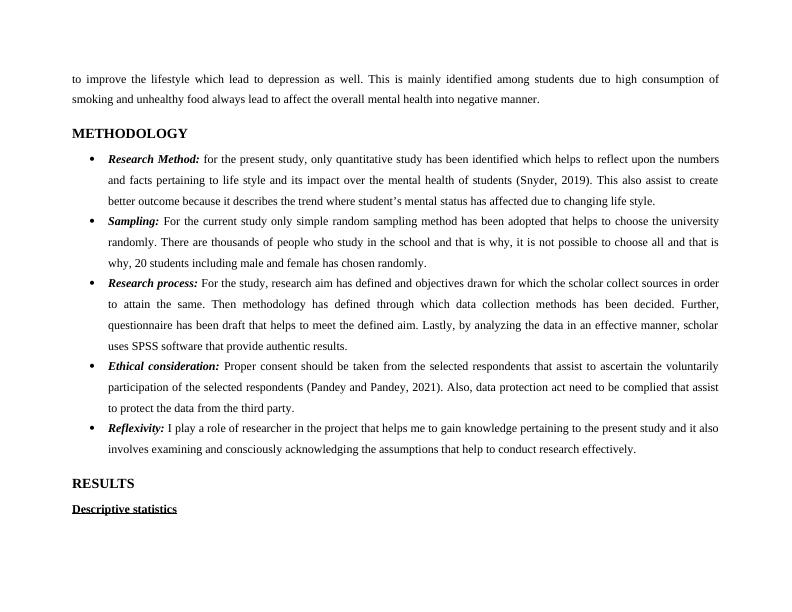
Through the table 1 as attached in appendix, it has been interpreted that mean age of all the people is 29 to 31 and most of the
selected students drink fizzy almost 2 glass. Further, 50% of the students stated that they are not good in health. Also, average number
of students see the screen for 2 hours and most of them stated that they watch electronic screen one hour daily. In addition to this,50%
of the selected participants stated that they do not have good life style and most of the people are facing issue frequently regarding to
lack of sleep and this in turn affected the life of people in negative manner. Most of the selected students are faces issue related to
health and this affect their mental health and that is why, there is a positive relationship between the mental health and life style.
Frequency
Lifestyle
As per the table 6, it has been interpreted that out of 20 students 6 of them stated that they have good lifestyle whereas 8 of them stated
they do not have but 6 of them stated that do not know about the same. This in turn reflected that all the participants do not have a
good lifestyle and there is a need to make changes
Stress faced in a school
The table 9 attached in appendix entails that 35% of the selected participants stressed about their career whereas 25% of them
stated that they stressed by their friends only. However, 20% of them stated that they have stressed related to health and faces
difficulties related to studies.
Relationship between mental health and life style
selected students drink fizzy almost 2 glass. Further, 50% of the students stated that they are not good in health. Also, average number
of students see the screen for 2 hours and most of them stated that they watch electronic screen one hour daily. In addition to this,50%
of the selected participants stated that they do not have good life style and most of the people are facing issue frequently regarding to
lack of sleep and this in turn affected the life of people in negative manner. Most of the selected students are faces issue related to
health and this affect their mental health and that is why, there is a positive relationship between the mental health and life style.
Frequency
Lifestyle
As per the table 6, it has been interpreted that out of 20 students 6 of them stated that they have good lifestyle whereas 8 of them stated
they do not have but 6 of them stated that do not know about the same. This in turn reflected that all the participants do not have a
good lifestyle and there is a need to make changes
Stress faced in a school
The table 9 attached in appendix entails that 35% of the selected participants stressed about their career whereas 25% of them
stated that they stressed by their friends only. However, 20% of them stated that they have stressed related to health and faces
difficulties related to studies.
Relationship between mental health and life style
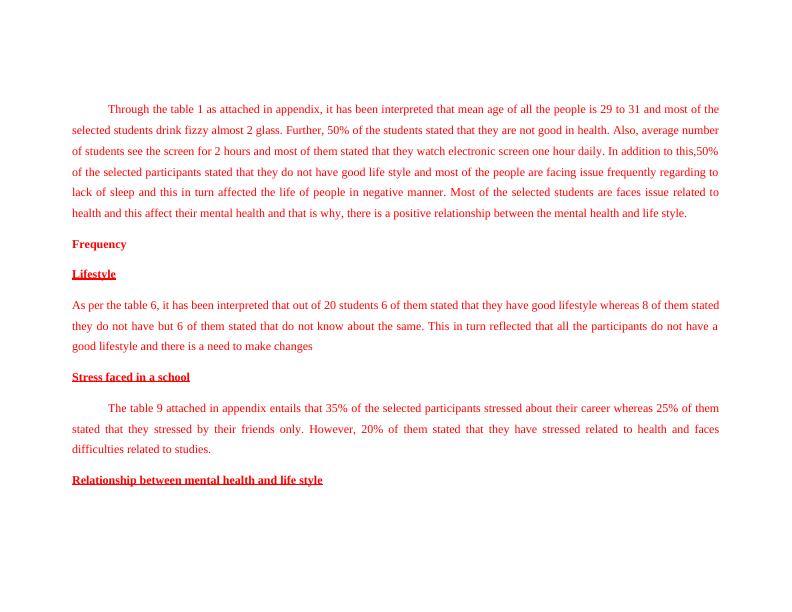
In accordance with the table 9, majority of the students stated that there is a positive relationship identified between mental
health and lifestyle because 60% of them stated yes and 10% of them stated no and only 30% people do not know anything about the
same.
Chi-squares
age and consumption of fizzy drink per day
H0: There is no difference between the age group of respondents to the number of fizzy drink consumption.
H1: There is a difference between the age group of respondents to the number of fizzy drink consumption.
There is a significant difference between the age and number of intake of fizzy drinks (as per the table 14) because the value
of p, 0.04 is lower than 0.05, that is why, alternative hypothesis is accepted.
Gender, age and relationship between mental health and lifestyle
H0: There is no significance relationship between mental health and lifestyle
H1: There is a significance relationship between mental health and lifestyle
In accordance with the chi-square test (table 56), it has been identified that there is no significance difference between the
values i.e. age, gender with mental health and lifestyle such that the value of p (0.311) is high than standard criteria because the
opinion of male and female varies, thus null hypothesis is accepted.
age and good life style
H0: There is no difference between the age and good life style
health and lifestyle because 60% of them stated yes and 10% of them stated no and only 30% people do not know anything about the
same.
Chi-squares
age and consumption of fizzy drink per day
H0: There is no difference between the age group of respondents to the number of fizzy drink consumption.
H1: There is a difference between the age group of respondents to the number of fizzy drink consumption.
There is a significant difference between the age and number of intake of fizzy drinks (as per the table 14) because the value
of p, 0.04 is lower than 0.05, that is why, alternative hypothesis is accepted.
Gender, age and relationship between mental health and lifestyle
H0: There is no significance relationship between mental health and lifestyle
H1: There is a significance relationship between mental health and lifestyle
In accordance with the chi-square test (table 56), it has been identified that there is no significance difference between the
values i.e. age, gender with mental health and lifestyle such that the value of p (0.311) is high than standard criteria because the
opinion of male and female varies, thus null hypothesis is accepted.
age and good life style
H0: There is no difference between the age and good life style
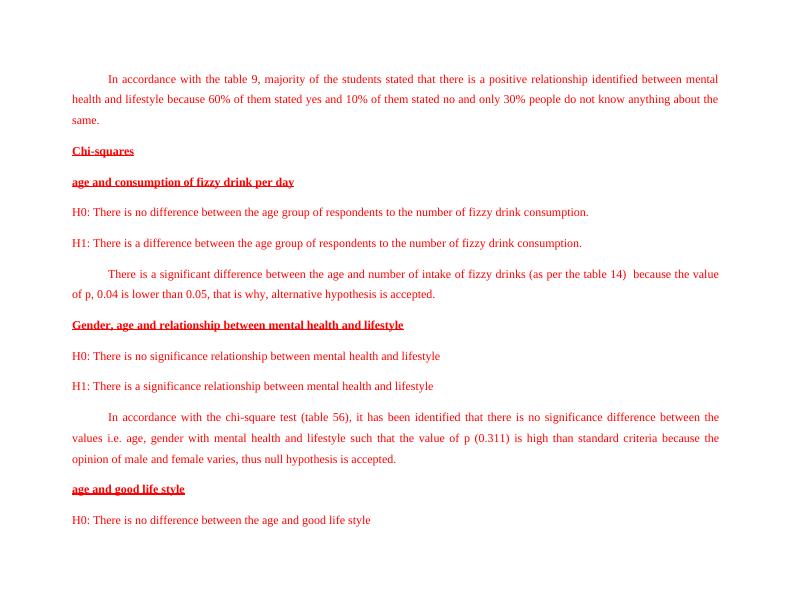
End of preview
Want to access all the pages? Upload your documents or become a member.
Related Documents
Impact of Obesity on Mental Health: A Review of Occupational Therapy Interventionslg...
|13
|3618
|108
Influence of Smoking on Well-being: A Quantitative Study among Students in the UKlg...
|18
|2890
|240
Understanding the Impacts of Commuting on Students of WSU Collegelg...
|11
|1531
|223
Effective Means of Managing Stress for University Studentslg...
|7
|1257
|158
Causes and Effects of Social Media Addiction on Mental Health of Students in UK: A Study on LSST, Londonlg...
|36
|6481
|312
Factors Associated with Growing Mental Illness Issues of Employees at Workplace in Service Based Industries: A Study on Hiltonlg...
|33
|12592
|79
